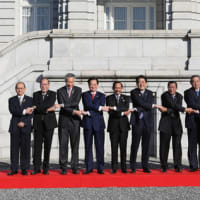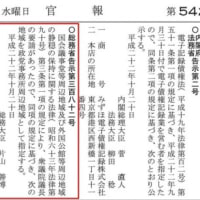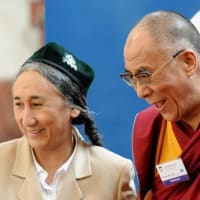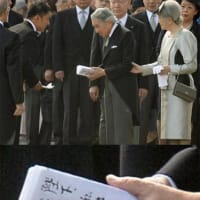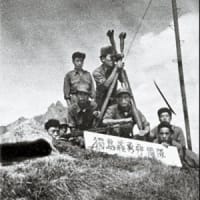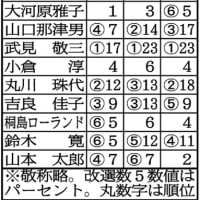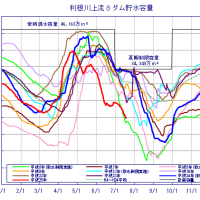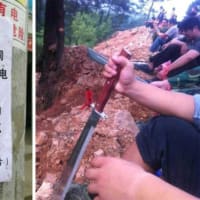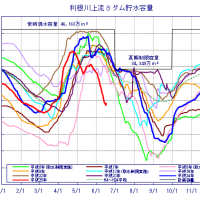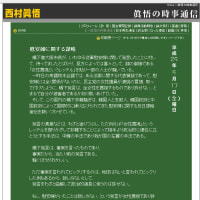靖国参拝「無意味な挑発」…NYタイムズが批判 (読売新聞) - goo ニュース
またONISHIさんかと思ったが、よく見ると社説とある。以下、社説(後で訳す予定)。
#署名がないが、社説もONISHIさんなのかな。
http://www.nytimes.com/
Editorial
Pointless Provocation in Tokyo
Published: October 18, 2005
Fresh from an election that showcased him as a modernizing reformer, Prime Minister Junichiro Koizumi of Japan has now made a point of publicly embracing the worst traditions of Japanese militarism. Yesterday he made a nationally televised visit to a memorial in central Tokyo called the Yasukuni Shrine. But Yasukuni is not merely a memorial to Japan's 2.5 million war dead. The shrine and its accompanying museum promote an unapologetic view of Japan's atrocity-scarred rampages through Korea, much of China and Southeast Asia during the first few decades of the 20th century. Among those memorialized and worshiped as deities in an annual festival beginning this week are 14 Class A war criminals who were tried, convicted and executed.
The shrine visit is a calculated affront to the descendants of those victimized by Japanese war crimes, as the leaders of China, Taiwan, South Korea and Singapore quickly made clear. Mr. Koizumi clearly knew what he was doing. He has now visited the shrine in each of the last four years, brushing aside repeated protests by Asian diplomats and, this time, an adverse judgment from a Japanese court.
No one realistically worries about today's Japan re-embarking on the road of imperial conquest. But Japan, Asia's richest, most economically powerful and technologically advanced nation, is shedding some of the military and foreign policy restraints it has observed for the past 60 years.
This is exactly the wrong time to be stirring up nightmare memories among the neighbors. Such provocations seem particularly gratuitous in an era that has seen an economically booming China become Japan's most critical economic partner and its biggest geopolitical challenge.
Mr. Koizumi's shrine visits draw praise from the right-wing nationalists who form a significant component of his Liberal Democratic Party. Instead of appeasing this group, Mr. Koizumi needs to face them down, just as he successfully faced down the party reactionaries who opposed his postal privatization plan. It is time for Japan to face up to its history in the 20th century so that it can move honorably into the 21st.
以下は、大西さんの署名コラム。「a nationalist war memorial」とはすごい表記だ。このコラムは訳すまでもないだろう。
http://www.nytimes.com/
Asians Angered, Again, by Visit to War Shrine by Japan Leader
By NORIMITSU ONISHI
Published: October 18, 2005
TOKYO, Oct. 17 - Prime Minister Junichiro Koizumi's visit to a nationalist war memorial here on Monday drew immediate and fierce criticism from Asian countries, threatening to isolate Japan and worsen its strained relations with China.
Beijing condemned the visit to the memorial, the Yasukuni shrine, as "a serious provocation to the Chinese people," and canceled bilateral talks on the North Korean nuclear crisis that had been scheduled for Monday. South Korea announced that it would cancel or postpone a trip to Japan scheduled for December by President Roh Moo Hyun.
On Monday morning, after months of speculation about the timing of a visit, Mr. Koizumi fulfilled his promise of praying annually at the shrine. The Shinto shrine, which deifies Japan's 2.5 million war dead, including war criminals responsible for atrocities throughout Asia, is regarded by most Asians as the symbol of unrepentant militarism.
"Prime Minister Koizumi has to bear the historic responsibility for damaging China-Japan relations," China's ambassador to Japan, Wang Yi, said in a statement on Monday.
In Seoul, Kim Man Soo, a spokesman for the president, said the South Korean government was no longer planning for a summit meeting in December or one-to-one talks between the leaders at a meeting next month of the Asia-Pacific Economic Cooperation ministers in Pusan, South Korea.
At tense talks last June in Seoul, President Roh told Prime Minister Koizumi that the visits to Yasukuni lay at the "core" of problems between the nations.
The visit to the shrine also drew protests from Taiwan and Singapore. The leaders of the Yasukuni shrine have long stood at the center of a movement to justify Japan's prewar conduct, arguing that Japan tried to liberate Asia from Western powers and was pushed into World War II by the United States, and that the war criminals enshrined there were innocent.
As Mr. Koizumi has led Japan to adopt a more assertive foreign policy, more politicians and public figures have also openly tried to justify Japan's past. Their message has resonated in a country where anxieties over a shrinking population, uncertain economic prospects and China's rise have led to an increase in nationalist sentiments.
Mr. Koizumi rejected criticism of his visit, saying that he was merely paying homage to Japan's war dead. "No foreign government should criticize the way we mourn our war dead," he said.
Mr. Koizumi, who arrived in his official car, said he had visited the shrine as a private citizen. He was flanked by a phalanx of bodyguards, and images of him at prayer were broadcast on television sets across the nation. To play down the significance of his visit, he wore a gray suit, in contrast to the formal wear of his previous visits. He also refrained from entering the inner shrine and did not follow the precise Shinto ritual of bowing and clapping.
While campaigning for his party leadership in 2001, Mr. Koizumi promised the politically powerful JapanWar-Bereaved Families Association that he would visit the shrine every year. So he has found himself cornered every year: yield to outside criticism and risk losing the backing of his nationalist supporters, or go to Yasukuni and enrage Asia. He has chosen the second option, and possible successors in his party have said they will continue the visits. The political opposition has called for an end to the visits and the construction of a new, secular memorial.
Seiji Maehara, leader of the main opposition Democratic Party, said, "I think he should surely be aware that the prime minister, as a public official, cannot distinguish the official from the private."
The muting of Mr. Koizumi's visit, though, appeared to be a concession to growing criticism at home.
Takenori Kanzaki, leader of the New Komeito, the governing party's junior coalition partner, told reporters that Mr. Koizumi probably took into consideration a ruling last month by the Osaka High Court that his visits violated constitutional separation of religion and the state.
It was perhaps also a slight concession to business leaders. While Japan's political leaders have tended to regard an increasingly powerful China as a threat, business leaders have regard it as an opportunity.
Hiroshi Okuda, chairman of Toyota and of Nippon Keidanren, Japan's powerful business association, said the prime minister had given consideration to domestic and international affairs by visiting the shrine as a private person.
But Kakutaro Kitashiro, the chairman of the Japan Association of Corporate Executives, another powerful association that supported Mr. Koizumi last month, was more critical, saying, "We hope that he will fully recognize that it might damage our national interest, that careful explanations must be given to our neighboring countries, and that diplomatic efforts must be made to gain their understanding."
またONISHIさんかと思ったが、よく見ると社説とある。以下、社説(後で訳す予定)。
#署名がないが、社説もONISHIさんなのかな。
http://www.nytimes.com/
Editorial
Pointless Provocation in Tokyo
Published: October 18, 2005
Fresh from an election that showcased him as a modernizing reformer, Prime Minister Junichiro Koizumi of Japan has now made a point of publicly embracing the worst traditions of Japanese militarism. Yesterday he made a nationally televised visit to a memorial in central Tokyo called the Yasukuni Shrine. But Yasukuni is not merely a memorial to Japan's 2.5 million war dead. The shrine and its accompanying museum promote an unapologetic view of Japan's atrocity-scarred rampages through Korea, much of China and Southeast Asia during the first few decades of the 20th century. Among those memorialized and worshiped as deities in an annual festival beginning this week are 14 Class A war criminals who were tried, convicted and executed.
The shrine visit is a calculated affront to the descendants of those victimized by Japanese war crimes, as the leaders of China, Taiwan, South Korea and Singapore quickly made clear. Mr. Koizumi clearly knew what he was doing. He has now visited the shrine in each of the last four years, brushing aside repeated protests by Asian diplomats and, this time, an adverse judgment from a Japanese court.
No one realistically worries about today's Japan re-embarking on the road of imperial conquest. But Japan, Asia's richest, most economically powerful and technologically advanced nation, is shedding some of the military and foreign policy restraints it has observed for the past 60 years.
This is exactly the wrong time to be stirring up nightmare memories among the neighbors. Such provocations seem particularly gratuitous in an era that has seen an economically booming China become Japan's most critical economic partner and its biggest geopolitical challenge.
Mr. Koizumi's shrine visits draw praise from the right-wing nationalists who form a significant component of his Liberal Democratic Party. Instead of appeasing this group, Mr. Koizumi needs to face them down, just as he successfully faced down the party reactionaries who opposed his postal privatization plan. It is time for Japan to face up to its history in the 20th century so that it can move honorably into the 21st.
以下は、大西さんの署名コラム。「a nationalist war memorial」とはすごい表記だ。このコラムは訳すまでもないだろう。
http://www.nytimes.com/
Asians Angered, Again, by Visit to War Shrine by Japan Leader
By NORIMITSU ONISHI
Published: October 18, 2005
TOKYO, Oct. 17 - Prime Minister Junichiro Koizumi's visit to a nationalist war memorial here on Monday drew immediate and fierce criticism from Asian countries, threatening to isolate Japan and worsen its strained relations with China.
Beijing condemned the visit to the memorial, the Yasukuni shrine, as "a serious provocation to the Chinese people," and canceled bilateral talks on the North Korean nuclear crisis that had been scheduled for Monday. South Korea announced that it would cancel or postpone a trip to Japan scheduled for December by President Roh Moo Hyun.
On Monday morning, after months of speculation about the timing of a visit, Mr. Koizumi fulfilled his promise of praying annually at the shrine. The Shinto shrine, which deifies Japan's 2.5 million war dead, including war criminals responsible for atrocities throughout Asia, is regarded by most Asians as the symbol of unrepentant militarism.
"Prime Minister Koizumi has to bear the historic responsibility for damaging China-Japan relations," China's ambassador to Japan, Wang Yi, said in a statement on Monday.
In Seoul, Kim Man Soo, a spokesman for the president, said the South Korean government was no longer planning for a summit meeting in December or one-to-one talks between the leaders at a meeting next month of the Asia-Pacific Economic Cooperation ministers in Pusan, South Korea.
At tense talks last June in Seoul, President Roh told Prime Minister Koizumi that the visits to Yasukuni lay at the "core" of problems between the nations.
The visit to the shrine also drew protests from Taiwan and Singapore. The leaders of the Yasukuni shrine have long stood at the center of a movement to justify Japan's prewar conduct, arguing that Japan tried to liberate Asia from Western powers and was pushed into World War II by the United States, and that the war criminals enshrined there were innocent.
As Mr. Koizumi has led Japan to adopt a more assertive foreign policy, more politicians and public figures have also openly tried to justify Japan's past. Their message has resonated in a country where anxieties over a shrinking population, uncertain economic prospects and China's rise have led to an increase in nationalist sentiments.
Mr. Koizumi rejected criticism of his visit, saying that he was merely paying homage to Japan's war dead. "No foreign government should criticize the way we mourn our war dead," he said.
Mr. Koizumi, who arrived in his official car, said he had visited the shrine as a private citizen. He was flanked by a phalanx of bodyguards, and images of him at prayer were broadcast on television sets across the nation. To play down the significance of his visit, he wore a gray suit, in contrast to the formal wear of his previous visits. He also refrained from entering the inner shrine and did not follow the precise Shinto ritual of bowing and clapping.
While campaigning for his party leadership in 2001, Mr. Koizumi promised the politically powerful JapanWar-Bereaved Families Association that he would visit the shrine every year. So he has found himself cornered every year: yield to outside criticism and risk losing the backing of his nationalist supporters, or go to Yasukuni and enrage Asia. He has chosen the second option, and possible successors in his party have said they will continue the visits. The political opposition has called for an end to the visits and the construction of a new, secular memorial.
Seiji Maehara, leader of the main opposition Democratic Party, said, "I think he should surely be aware that the prime minister, as a public official, cannot distinguish the official from the private."
The muting of Mr. Koizumi's visit, though, appeared to be a concession to growing criticism at home.
Takenori Kanzaki, leader of the New Komeito, the governing party's junior coalition partner, told reporters that Mr. Koizumi probably took into consideration a ruling last month by the Osaka High Court that his visits violated constitutional separation of religion and the state.
It was perhaps also a slight concession to business leaders. While Japan's political leaders have tended to regard an increasingly powerful China as a threat, business leaders have regard it as an opportunity.
Hiroshi Okuda, chairman of Toyota and of Nippon Keidanren, Japan's powerful business association, said the prime minister had given consideration to domestic and international affairs by visiting the shrine as a private person.
But Kakutaro Kitashiro, the chairman of the Japan Association of Corporate Executives, another powerful association that supported Mr. Koizumi last month, was more critical, saying, "We hope that he will fully recognize that it might damage our national interest, that careful explanations must be given to our neighboring countries, and that diplomatic efforts must be made to gain their understanding."










